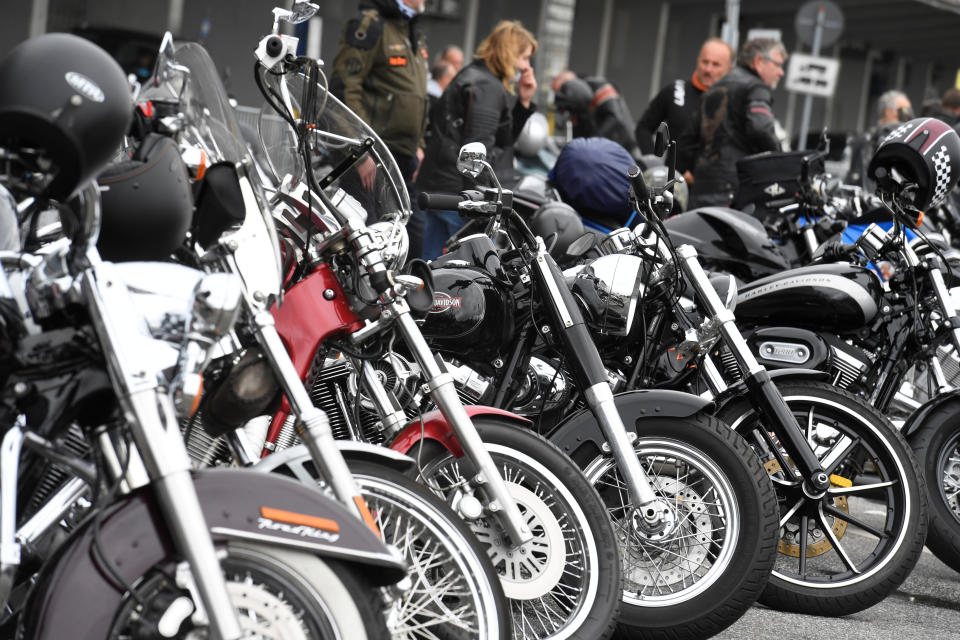Trump should buy Harley-Davidson
President Trump fancies himself a businessman. But his resume seems incomplete. To fully understand how businesses work, here’s a modest suggestion: He should buy the motorcycle company Harley-Davidson (HOG).
Trump is feuding with Harley, because the company is trying to save itself from Trump’s trade wars. The company said recently that it plans to move production of bikes destined for Europe from US plants to overseas facilities. This is a direct response to Trump’s protectionist actions. After Trump imposed new tariffs on European steel and aluminum imports, Europe responded by imposing tariffs on a basket of American imports, including Harley’s bikes. The new tariffs raise the cost of a Harley in Europe by around $2,200, and Harley doesn’t think Europeans will pay that premium. The company isn’t willing to eat the loss itself, either. So it plans to build the bikes overseas, where the new tariff won’t apply and it will still be able to turn a profit—which infuriated Trump and triggered a Twitter condemnation.
It’s that profitability part Trump doesn’t seem to understand, which is why he should buy the company, leaving him free to run it at a loss and fulfill his trade agenda. Sure, buying a big public company would require some kind of special dispensation from the government’s ethical overlords. Let’s say he gets it. Trump can’t afford to buy Harley himself. The company’s market value is around $7 billion, and he’s worth less than $3 billion. But Trump has rich friends, and he could recruit some fellow investors to help him take the company private. Without public oversight, Harley could pay the tariffs, lose money and answer to nobody but Trump.

The problem with Harley now is that it has to do what’s in shareholders’ interest. So it can’t abide by Trump’s money-losing tariffs when there’s a better option. Other companies hurt by Trump’s tariffs are likely to do the same thing and move production offshore, because they don’t have much of a choice when the cost of producing in your home market suddenly jumps. And costs jump when governments impose tariffs.
Harley must answer to public shareholders
Trump ran his own business, of course—but he didn’t have to deal with the kind of government interference he’s now imposing on other companies. The Trump Organization, for one thing, is privately owned. So Trump rarely had to answer to the public about how he ran the business, except when somebody sued him. He was free to make money or lose money, and run the firm competently or terribly. The only people who cared were lenders who wanted to get their money back, and even then, Trump entities declared bankruptcy four times, stiffing the lenders.
Trump also didn’t have to steer around the kind of trade protections he’s now hurling at companies. As a real-estate developer, and then a celebrity endorser, Trump never manufactured a product bound for global markets. He undoubtedly marketed himself globally, and still does. But Trump makes money by selling services, not goods. When foreigners stay at Trump hotels in the United States, the Trump Organization earns money by selling them lodging, food and amenities. When the company licenses the Trump name to properties built and owned by somebody else, it collects management and service fees. Notably, President Trump hasn’t levied any tariffs on services.
Trump seems surprised that any company would oppose his tariffs, which help some firms but hurt others. If he bought Harley, he could run it as an example for all the other companies he wants to line up behind his tariffs. He could keep all production in the United States, pay the tariffs, sell motorcycles at a loss and tell anybody who doesn’t like it, too bad. He could stop selling Harleys in Europe altogether, to punish the Europeans for standing up to his tariffs. No Harleys for you! That’d show ’em. The bikes might even seem more American if you could only buy them in America.
Revenue would drop and the company would shrink, but there would be no public shareholders or Wall Street analysts to complain. Trump could keep all his workers on staff anyway, even if they didn’t have anything to do because there weren’t enough orders. Harley would remain a great American brand, untarnished by anything except mounting losses and eventual bankruptcy. The bikes would probably even rise in value once the company went out of business.
Confidential tip line: [email protected]. Click here to get Rick’s stories by email.
Rick Newman is the author of four books, including Rebounders: How Winners Pivot from Setback to Success. Follow him on Twitter: @rickjnewman
Follow Yahoo Finance on Facebook, Twitter, Instagram, and LinkedIn
